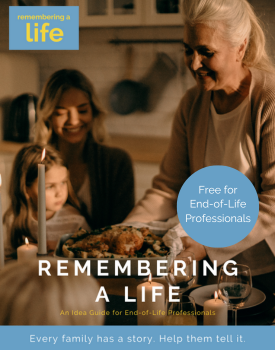One of the greatest gifts my father ever gave me was help planning his very own death. About a month or two before he died, he sat me down at the kitchen table and he helped me make a list of everything I needed to do once he was gone. I couldn’t believe he was asking me to do this, but he was adamant, and so I sat there as he helped me to make a list of everything I would have to do. Call the mortuary, write an obituary, order death certificates, close bank accounts. I cried as I wrote things down, in disbelief of the entire moment.
But you know what? After he was gone, the first thing I did was get out that list and it was like he was still there with me, parenting me through his own death. I never would have had any idea about what to do, who I needed to call, or where to look for information about any of this. It was truly such a GIFT that my father helped me to prepare for these tasks.
I know it’s hard and can even feel scary to think about this stuff, but the truth is that all of us are going to encounter death in our lives and we are often ill-prepared to handle the logistics. But where do we start? Where do we even turn when we don’t have someone like my dad guiding us through the process?
You've lost a loved one, now what?
There can be so much confusion in the moments, days and weeks after your person dies. The logistics of what needs to happen after a person dies just aren’t common knowledge in our culture. Who do you call when your loved one dies? What if their death occurs while traveling abroad? How do you notify family and friends in the midst of making so many other practical decisions? These questions can feel overwhelming, which is why I’m grateful for the resources provided on RemeberingALife.com.
The reality is, not everyone has the advantage of knowing their loved one’s wishes ahead of time. Most people have unconscious fears and questions around death, which can lead to procrastination in making an advanced plan. Funeral directors play an important role – they are skilled professionals who provide guidance and help alleviate as many stressors as possible. And Remembering a Life helps family and friends navigate what to do when a loved one dies, including even providing resources to help find an ethical and reputable funeral home.
Help and resources are available
As a therapist specializing in grief, I know that much of the anxiety we experience when going through a big loss is due to difficulty navigating some of the logistics and practicalities around the death of a loved one. One way to alleviate that anxiety is to be informed and prepared. The Remembering a Life website covers resources for just about everything you might need to figure out after the death of a loved one. From navigating deaths in locations like nursing homes or circumstances like deaths due to gun violence, there is information and helpful guidance.
There is even information about how to utilize different kinds of end-of-life professionals, how to work with funeral directors and how to navigate the task of alerting friends and family to a loss. If you are facing the death of a loved one, being able to use these resources will provide comfort and solace as you face the tasks ahead. Even if someone you know is facing a loss, you can help them by reading up on these resources and being prepared to help them when the time comes.
Ease anxiety & find peace with pre-planning
One of the most interesting parts is that I’ve also even found that personally facing death and my fears about it have eased my own anxiety in significant ways. Meeting with an NFDA funeral director is one way to begin the pre-planning process and can help alleviate anxiety by helping you make informed decisions. It can seem scary at first to do this kind of planning but after you’ve moved through it, there’s a real peace that comes with knowing that things are in place. Not to mention, it’s truly a real gift to the people you love who will be the ones left behind to navigate these things in your absence.
Our culture has long shied away from end-of-life planning and talking about grief and loss, but it’s time to change that. Embracing death is a way of embracing life. It’s a way of taking care of ourselves and our loved ones.
Want to learn more? Listen to Claire Bidwell Smith discussing The Rules of Inheritance, a memoir about experiencing the deaths of both of her parents before she was 25 years old.
Listen now: Remembering A Life Podcast: The Rules of Inheritance


